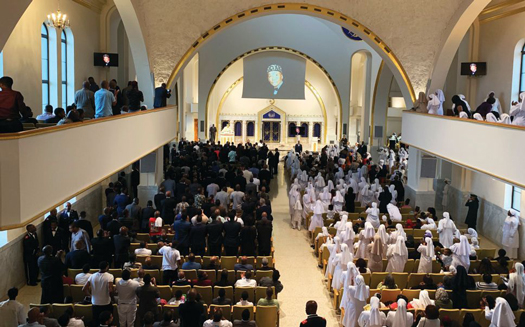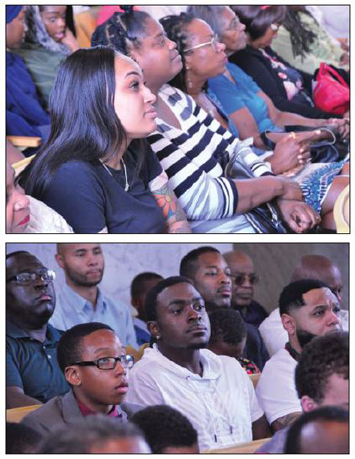Chicagoans call reparations, separation an important part of the message
By Tariqah Shakir-Muhammad -Final Call Newspaper- | Last updated: Jul 23, 2019 - 10:15:08 AMWhat's your opinion on this article?

Mosque Maryam was packed on July 21 to hear the Hon. Min. Louis Farrakhan speak.
|
CHICAGO—Severe thunderstorms didn’t stop more than 1,500 people who filled Mosque Maryam, the headquarters mosque for the Nation of Islam, to hear the Honorable Minister Louis Farrakhan, National Representative of the Honorable Elijah Muhammad and Nation of Islam. His message, which touched on a variety of critical topics, resonated in different but positive ways with his audience.
To listeners present July 21 in the beautiful edifice, the idea of Black people receiving reparations and separation was among the most impactful subjects covered.
Min. Farrakhan, sharing the words of his teacher, the Hon. Elijah Muhammad, said Blacks need states in the South as a separate territory. With a vision, its growing population and wise voting, Blacks could take over states in the South and build a new reality for themselves, said the Minister.
“The reparations we need is land, land that we can call our own, land that is mineral rich and with an outlet to the sea as requested by the Honorable Elijah Muhammad,” Eastern Regional Representative and Student Minister Abdul Hafeez Muhammad said in an interview with The Final Call.
“This land is ours. It has our blood, our sweat and our tears; they stole us, they owe us. They don’t owe us only because they stole us. They owe us because they robbed us of the ability to think and that they were not supposed to do. Therefore their kingdom has been weighed in the balance and has been found wanting.”
Julius Cosby, 35, from the Sunni Muslim community, believes Minister Farrakhan’s message was well said and timely.
“I think it’s necessary so far to the point the government has proven no longer liable or responsible enough to take care of Black people in America so the only solution would be for us to get our own property so we can take care of ourselves,” he told The Final Call.

Sisters and brothers listen to the lecture at Mosque Maryam.
|
“A lot of people won’t accept it because White supremacy and European ideologies have affected people’s viewpoints of Black people in America becoming independent, away from the ideas of European colonialism. People won’t be open to the idea because they want us to assimilate into nothingness. I think first there has to be demand, community, discipline—you know, not just saying it one time and quitting, and then of course divine guidance.”
Aaliyah Muhammad, 18, agreed wholeheartedly with the Hon. Elijah Muhammad’s program for reparations.
“I believe that if we come together, we can actually accomplish that because I know that all of us want the same thing, and with the right connect with one another, we can actually get that. So I believe if we start small then we can get to that point. … We need the mass majority to go step-by-step to do that.”
Amontae Campbell, 28, who works at St. Sabina Church agreed that Blacks should own land as a start. “That would be a good starting point for us to get together as a community and start that healing factor.”
A mother of two teenage boys and a Christian, Charlnette Riley, said reparations starts with Blacks reconciling with one another.
“When he talked about reparations, what I got the most is I got to love myself and I got to believe in me and I can’t put my faith and trust in man, I have to put my faith and trust in a higher power and I can’t get into that fictitious part of it and I have to believe in myself,” she said.
Mrs. Riley expressed, through tears, the hopes she has for her sons. “The Minister preaches that, I’ll never forget, back in about ’94 and I was here for Fathers’ Day and he was talking about fatherhood and how you have to be at the head of your table and cover your family, and stop making women be the mother, the father, the protector; that’s not my job, that’s his job and I want my sons to get it.”
Her son, Chandler Riley, who is in high school, said the Minister’s lecture taught him more than he had imagined.
“It was a lot of stuff that I didn’t feel like I knew, and a lot of reactions kind of did it for me. I feel like this was a really good experience for me and I can use it moving on forward,” said the 16 year old.
His brother, Charles Riley who is 20 and in his junior year of college, agreed that the Minister’s lecture overall was impactful. “What I learned in there was really like, basic tools I can use in my everyday life that I’ve been using but it was said differently and it added more meaning because as a man you have to hold certain qualities and just grab a dream, take a hold of it and just keep going. Rather that’s Allah, God—you always have to believe there’s a higher power in something, take that and just run with it.”
“I think he was right on point, I think it makes a lot of sense,” said 23-year-old Taylor Sanders, who is an events and engagement coordinator. “I think that’s good guidance for the people and I think that more people need to understand what reparations are and how much it can impact our community.”
“Anybody who wants good for the Black community should have a positive response to it regardless of who it came from, I think that the message is not really who it came from but is more of uplifting our people and getting our people out of the hole we’re in.”
Komaneach Wheeler, 39, and an activist in the Black and Christian community passionately said, “If justice were to be served, it’s a lot of pain and suffering and damage that only us as a people can do for each other so I think that would be a great thing for us to get amongst ourselves because the only one that can heal us is ourselves.”
Seventh Region Representative of the Nation of Islam Patrick Muhammad said the Minister’s mentioning of reparations reminded him of the biblical stories of Moses, Aaron and Pharaoh. “When it got to the time where the plagues were affecting pharaoh, and the more that the plagues were affecting, it actually forced Pharaoh to have to have a conversation or some type of negotiation with Moses and Aaron,” he said, relating “Pharaoh” to America’s holding of Black people today.
“This is the first time I recall the Minister saying watch the weather as it goes through the stages of severity,” he added.
Nation of Islam Student Minister Dr. Wesley Muhammad reiterated the Minister describing what reparations looks like in the Honorable Elijah Muhammad’s vision contained in “What the Muslims Want, What the Muslims Believe,” which is found on the inside back page of The Final Call newspaper.
“He (Min. Farrakhan) spoke the program of the Most Honorable Elijah Muhammad given by God Himself. The only appropriate reparations package would be the eight to ten states with support of the U.S. government for 20-25 years. If the reparations package doesn’t look like that, then it’s not the solution to the race problem in America, God gave the solution and it includes reparations but not checks thrown out to Black people.”
INSIDE STORIES AND REVIEWS
-
-
About Harriett ... and the Negro Hollywood Road Show
By Rabiah Muhammad, Guest Columnist » Full Story -
Skepticism greets Jay-Z, NFL talk of inspiring change
By Bryan 18X Crawford and Richard B. Muhammad The Final Call Newspaper @TheFinalCall » Full Story -
The painful problem of Black girls and suicide
By Charlene Muhammad -National Correspondent- » Full Story -
Exploitation of Innocence - Report: Perceptions, policies hurting Black girls
By Charlene Muhammad -National Correspondent- » Full Story -
Big Ballin: Big ideas fuel a father’s Big Baller Brand and brash business sense
By Bryan Crawford -Contributing Writer- » Full Story






 Click Here Stay Connected!
Click Here Stay Connected!








